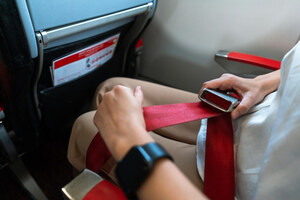Artemis Aerospace explores a day in the life of a flight trainer
Everyone remembers a good teacher. However, a flight instructor for the commercial aviation industry is mentoring students who will go on to be responsible for thousands of people's lives over the course of their career. Artemis Aerospace looks at the work of the people who teach pilots to fly.
WISTON, England, March 18, 2024 /PRNewswire/ -- Becoming a qualified pilot is a major undertaking, and for many people it's the realisation of a lifelong dream. The responsibility of getting them to that stage falls on the flight instructor, and it's a complex, but incredibly rewarding job. Currently, there's a shortage of both pilots and trainers, so now is a great time for pilots to consider utilising their flying skills to bring on the next cohort.
To become a flight instructor, you will need to undertake a course lasting around five or six weeks if done on a full-time basis. There are stringent pre-entry requirements for this, and applicants are usually required to have:
- A UK CAA CPL (Commercial Pilot's Licence) or PPL (Private Pilot's Licence) plus at least 200 hours flying time of which 150 should be as PIC (Pilot in Command).
- A pass in CPL-level theoretical flight knowledge exams.
- Ten hours instrument flight training and twenty hours VFR (Visual Flight Rules) cross country flying as PIC including landing at different aerodromes.
- A required number of hours of SEP (Safety and Emergency Procedures) training.
- A pass in a pre-course flight test no longer than six months before entry to the course.
A flying instructor's course will usually involve around 30 hours of teaching and learning tuition, 100 hours of theory, and 30 hours of flight training, leading to a final exam and FI certification.
There isn't a typical day in the life of a flight instructor. As a multi-crew co-operation instructor, you will be training students to operate as both pilot and co-pilot in a multi-engine commercial aeroplane, involving VFR (Visual Flight Rules) and IFR (Instrument Flight Rules) and all the complexities associated with optimum decision-making, communication, teamwork, and flying in all weather conditions and emergency situations.
An instructor at British Airways' Global Learning Academy might be tutoring students from airlines all over the world on a Flight Technical Training conversion course, designed for pilots to familiarise themselves with a specific type of aeroplane such as an Airbus A380 or a Boeing 787.
BA's Speedbird Pilot Academy has instructors teaching 60 future BA pilots a year – aside from flying, this will involve systems checks, cockpit instrumentation lessons, practical skills, customer service and leadership development.
A crucial part of all pilot training is time spent on an aircraft simulator. A synthetic flight instructor teaches the basic principles of flight, take-off and landing, safety, and instrument familiarisation within a safe environment. Students can practise approaching every airport in the world, fly any type of aeroplane and encounter every possible weather condition and emergency scenario. In addition, all qualified pilots must undergo regular evaluation by an instructor in a simulator in order to renew or revalidate their licence.
The current skills shortage in the aviation industry has meant that there is a significant backlog of both trainee and trained pilots needing to put in their qualifying hours on a simulator. At Artemis, our simulator support service provides vital back-up, twenty-four hours a day, seven days a week, helping to keep training schedules on time by providing detailed hardware support and fault prevention solutions.
Without a large pool of qualified and enthusiastic flying instructors, worldwide flight would grind to a halt. It's a fascinating and varied career for aviators who want to share their years of accumulated knowledge and experience and pass the baton to the next generation of aspiring pilots.
Artemis Aerospace offers an innovative approach to component solutions for the aviation sector. Established in 1999, the company has earned a reputation for outstanding customer service by solving problems and providing a range of realistic options that offer customers the flexibility and freedom to choose a solution that suits their timescale and budget. Its services include component supplies, component repairs, lessor support, flight simulation hardware support, consignment stock management and global aircraft logistics.
With decades of expertise in global aviation logistics, the expert team works with trusted MROs, OEMs, and aftermarket suppliers around the world to offer 24/7 support to its global customer base.
Website: www.artemisaerospace.com
Photo - https://mma.prnewswire.com/media/2360496/Artemis_Aerospace.jpg







Share this article